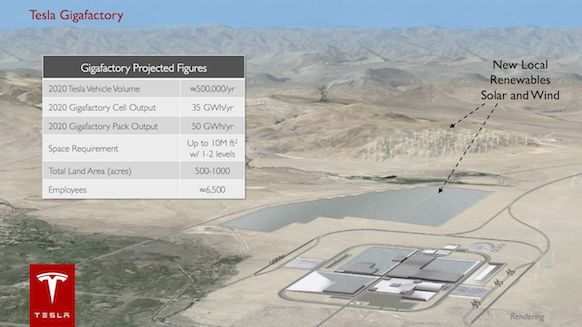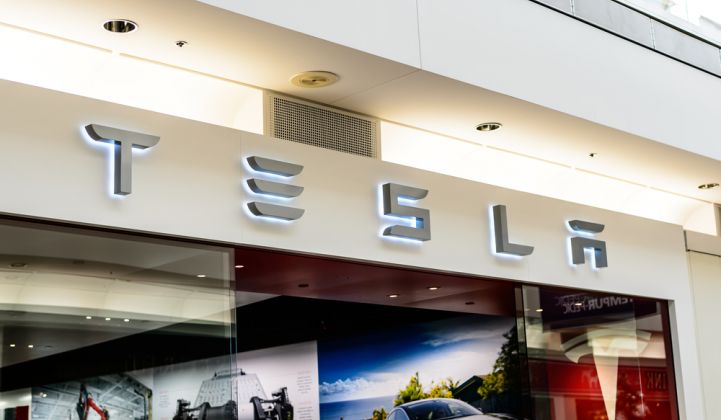Add California to the list of states eagerly courting Tesla to be chosen as the site of its $5 billion Giga battery factory.
The as-yet-unnamed location of Elon Musk's outrageously ambitious factory has been narrowed down to Texas, Arizona, New Mexico or Nevada for a while now. Now California wants to be on the list and has made an aggressive move to throw its hat in the ring, with new legislation introduced yesterday morning which looks to remove the regulatory and permitting roadblocks to constructing this enormous project.
California Senate Bill SB-1309 was introduced by Senate President Pro Tem Darrell Steinberg, a Democrat, and Senator Ted Gaines, a Republican). Some of the relevant language is excerpted below:
- This bill would state the intent of the Legislature to enact legislation to expedite groundbreaking and construction in California of a large-scale battery factory to manufacture batteries for both electric-vehicle and stationary uses. This bill would declare that it is to take effect immediately as an urgency statute.
- It is the intent of the Legislature to enact legislation, including, but not limited to, financial incentives and changes to regulatory and environmental processes, to expedite groundbreaking and construction in California of a large-scale battery factory to manufacture batteries for both electric-vehicle and stationary uses thus increasing the production of electric vehicles and renewable energy consistent with California’s efforts to fight climate change as well as creating economic opportunity and thousands of jobs in California.
We recently covered a presentation from Tesla CTO JB Straubel, in which he spoke of attacking the battery's cost with the Giga factory by "doubling the worldwide capacity in a single factory and reinventing the supply chain." He said that Tesla would be "breaking ground in the next few weeks."
Tesla aims to build 500,000 cars per year by 2020.
A total of 35 gigawatt-hours of cell production from the new plant will be devoted to meeting the needs of the Fremont automotive plant, and 15 gigawatt-hours will be devoted to stationary battery packs. Straubel said that Tesla was "bullish" about the California energy storage mandate. Straubel also said he was bullish that stationary energy storage "can scale faster than automotive."
The project has the potential to provide more than 6,000 jobs.
Allen Young of Silicon Valley Business Journal notes that "the legislation does not call out by name the California Environmental Quality Act, but some modification to the controversial law can be easily inferred," according to a Capitol staffer.
Musk is naming two sites, according to Bloomberg, saying, "What we’re going to do is move forward with more than one state, at least two, all the way to breaking ground, just in case there are last-minute issues."
It will leave one state very disappointed when the final decision is made, but it's being done to "minimize the timing risk," according to Musk. It also maintains leverage on the municipality all the way to ground-breaking.
Sites in California that have been floated include near the Salton Sea and in the state capital, Sacramento.
Here are some highlights of our recent coverage of the politics behind choosing the factory site.
Luring Tesla with incentives at secret meetings
Texas: The San Antonio Express-News reports that unnamed Tesla executives met on Wednesday with the mayor of San Antonio, as well as with "the county's top elected official, economic development folks, and someone from the local utility company."
Despite having banned the direct sales of Tesla vehicles in its state, Texas is a contender in the race for the factory. It appears that the state's leadership might be inclined to change what Governor Rick Perry referred to as "antiquated" car dealer franchise laws in an appearance on Fox Business News.
The city of San Antonio remains under consideration, as does Lubbock (which could have an advantage with its access to West Texas wind power), according to numerous reports.
Arizona: Despite opposition from auto dealers, Arizona's state legislature is considering a bill to allow direct sales, according to the Phoenix Business Journal.
Tucson mayor Jonathan Rothschild told the Arizona Daily Star that a potential site has been selected by the city. A state and city tax incentive package will be offered. The same article reported that the city of Mesa's Mayor Scott Smith, now running for Arizona Governor, sent Tesla CEO Elon Musk an invitation to visit.
According to the Phoenix Business Journal, Tesla could benefit from the same state incentives offered to Apple's new plant in Mesa, AZ, namely, "Gov. Jan Brewer and business groups support a new bill that would eliminate taxes on energy used by manufacturers." Arizona’s offer could include a 5 percent property tax rate, as well. "State lawmakers are also considering another new bill that would give income tax breaks for companies whose manufacturing facilities are powered by solar and renewable sources," according to the report.
New Mexico: The Albuquerque Journal reports that New Mexico governor Susana Martinez, a Republican, was "considering a special legislative session to work up an economic package for a possible Tesla factory." According to the report, "Democratic legislative leaders said a special session to woo Tesla would be unprecedented, and appropriate only if New Mexico has evidence that it was Tesla’s pick." In 2007, Albuquerque was close to being chosen as the site of the Tesla Roadster factory.
Nevada: Last month, the Reno Gazette reported that Tesla execs have been looking at sites around the northern part of Nevada. This month, northern Nevada is the "frontrunner," according to the Phoenix Business Journal. The Journal goes on to report that "the Reno area in northern Nevada is the odds-on favorite to land the Tesla plant," citing multiple business and political sources in Phoenix. The Reno-Stead Airport has been suggested as a possible site, with its thousands of acres available for development and ready access to rail transport.
Three reasons why Tesla should choose Texas
As GTM's Katie Tweed has reported, there is a legislative effort in a number of states to shut down Tesla from selling directly to the consumer through its own stores and forcing the company to follow laws that prohibit factory-owned dealerships. New York has agreed to allow the electric vehicle maker to keep its five company-owned outlets open, but permits no further expansion. There's a deal being made in Ohio to limit the number of Tesla outlets to three. There is still an acrimonious conflict ongoing in New Jersey. Tesla has had favorable court decisions in Massachusetts, and the EV pioneer has also won a round of court skirmishes in Minnesota.
If direct sales are banned in a state, customers can visit Tesla "galleries," but they aren't allowed to talk price or take a test drive.
Texas went through a two-month effort to pass bills in its legislature that would allow Tesla Motors to sell electric cars directly to consumers. The effort died last summer after lawmakers failed to vote on the issue before adjourning. The legislature will not meet again until 2015.
Texas Gov. Rick Perry, a recipient of more than $300,000 in traditional car dealer campaign contributions, bucked his donors a bit and said in an interview with the Fox Business channel that "Tesla's a big project." He told Maria Bartiromo, "The cachet of being able to say we put that manufacturing facility in your state is hard to pass up." Perry added that he thinks "the pros of allowing this to happen outweigh the cons," and that doing away with the ban on direct sales is a “conversation that is worth happening.”
Giga Factory Facts and Figures
-
Tesla announced a $1.6 billion convertible debt offering. Tesla looks to offer $800 million of convertible senior notes due in 2019 and $800 million due in 2021 to build the world's largest battery factory.
-
Elon Musk predicts that the new factory will produce batteries for 500,000 vehicles by 2020.
-
Tesla expects to send the kilowatt-hour price of batteries down by 30 percent.
-
The plan is for construction to start in 2014, with production beginning in 2017.
-
The facility will hold more than 6,000 workers in 10 million square feet of factory space.
-
The plant will provide recycling capability for old battery packs.
-
Musk also said that Panasonic, currently supplying hundreds of millions of cells to Tesla, would likely join in on the new factory, but no commitments have been made.
Here's a rendering of the proposed plant:




